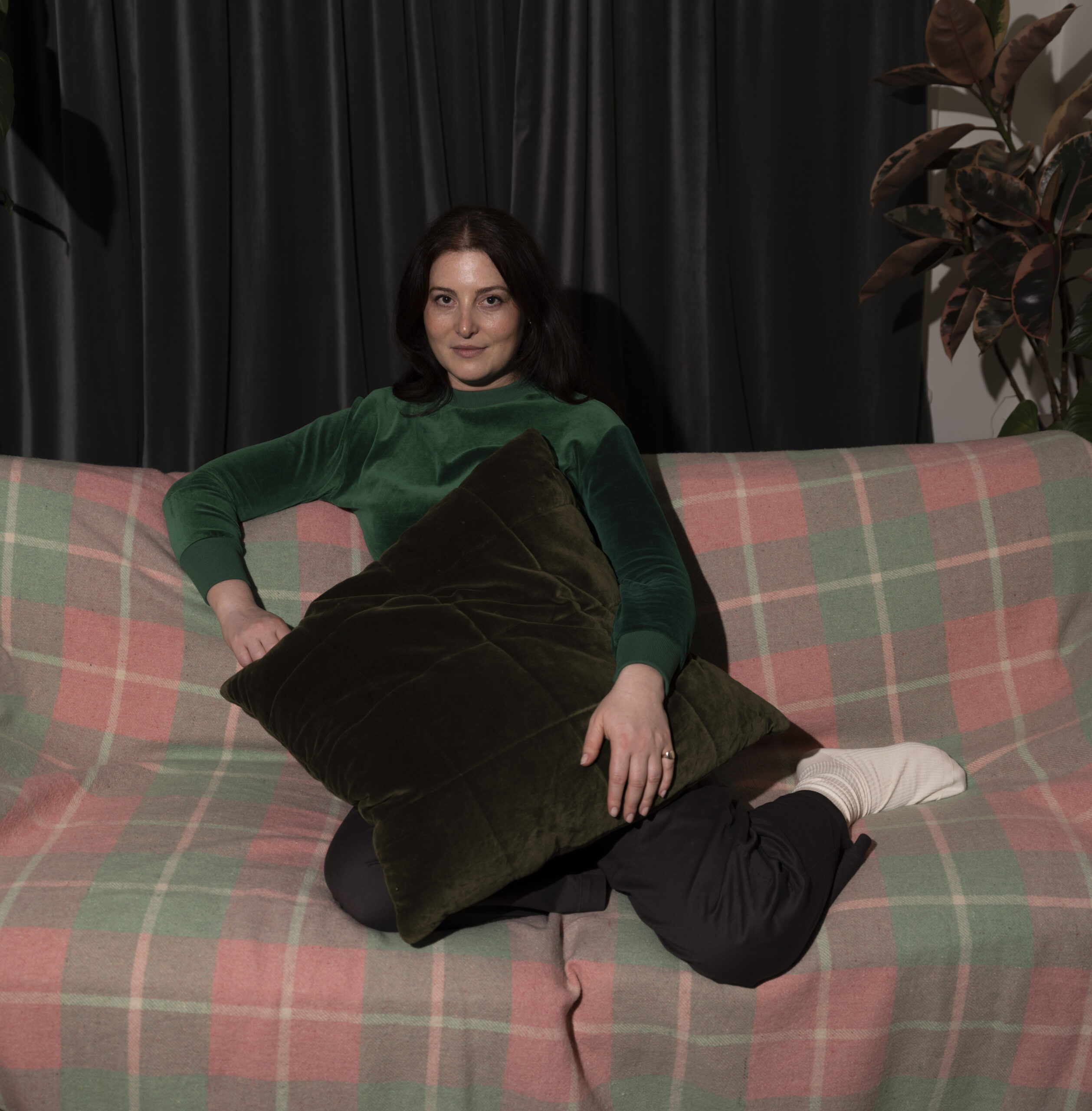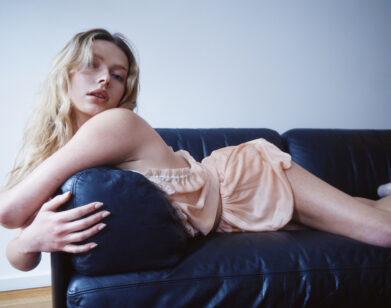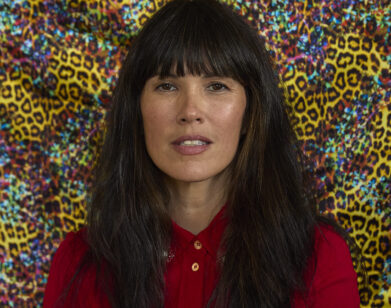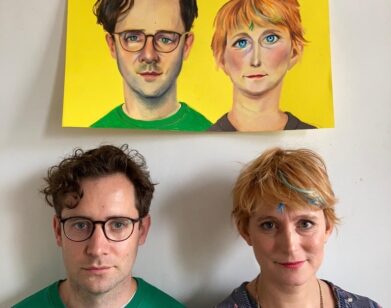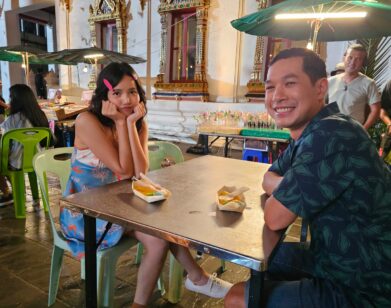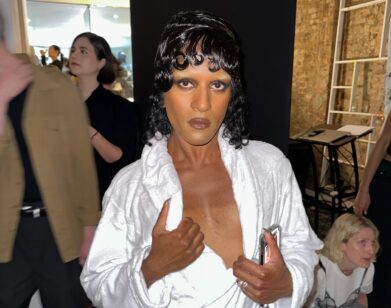HEX
How a Real-Life Stalker Inspired Author Ella Baxter’s Furious Art World Satire
“So many artists disintegrate during the week of their show,” says a gallerist in Ella Baxter’s new novel Woo Woo. It’s an observation that Baxter—a fine artist and the author of New Animal—tells me she came upon while dating artists in her twenties, before realizing she was one herself.
Woo Woo follows Sabine, a multimedia and conceptual artist, during the week leading up to her career-defining show titled “Fuck You, Help Me.” Sabine, who smokes, drinks, live-streams, and prostrates herself at the altar of art, is visited by spirits and heckled by her TikTok followers, all while being terrorized by a stalker she names the Rembrandt Man.
In Woo Woo, Baxter pulls off something startling, transubstantiating her own experiences as an artist (she, too, was stalked relentlessly) while tapping into the seemingly eternal force of female rage. She’s bold, singular, and wickedly funny, qualities she possesses both in person and in prose. Drinking plum wine at her kitchen table earlier this fall, we discussed publicity, art monsters, and novels as occult acts.
———
PAUL DALLA ROSA: How are you finding the press tour for Woo Woo?
ELLA BAXTER: I mean, it’s fine. I’m not very good at it. I was so anxious about talking about having a stalker in a way that wasn’t going to be palatable, so I kind of practiced saying things before and then just repeated them in all the interviews. But now I look back and I’m like, “Maybe I should have just said what I wanted.”
DALLA ROSA: Well, I can ask about the stalker. Obviously, a part of Woo Woo is that Sabine is being stalked. You’ve been stalked, you’ve written a book about it. The acknowledgments address the stalker directly. And obviously, you’ve had to talk about it quite a lot. Is there anything else to say?
BAXTER: I mean, there’s so much to say on it. When I sold the book to publishers, I could tell that that was going to be something that was pushed to the front for publicity. And I get why—I do understand that. But I think it kind of dilutes the fury behind it and how, essentially, Woo Woo is really petty at its core. The fact that I’ve written this book is such, in a way, a ferocious response, but it’s also really petty. Something that’s supposed to remain private and be exhausting and horrific, I’ve now made public, and I just think that that’s a bratty move on my part. I’m proud of myself, but it’s not something I recognize as good.
DALLA ROSA: There’s something pretty powerful there. I know how it can be with a book, how you sort of get pushed to talk about the most salient issue.
BAXTER: It’s like, you’ve got to have the story to support the art. They’re also mushed such that there’s no separation—art and life are one. They’re completely tessellated. As I was writing Woo Woo, I was still being stalked. So it was this kind of triad—the book, the stalker and me—all feeding each other.
DALLA ROSA: And so much of Woo Woo is about press, because Sabine’s opening the exhibit and is the face of the exhibit. Sabine is kind of in the throes of mania. The mania is due in part to the fact that she’s being stalked, but it’s not just because of that.
BAXTER: No.
DALLA ROSA: She’s an artist. And I really recognized her. She’s finished a project and now there’s nowhere for that energy to go.
BAXTER: And by the time you’ve finished the book, you’re in full flight because you’ve kind of learned how to do it. By the time I’d finished Woo Woo, I had no breaks. I didn’t actually know how to stop being in that really intense state of conversation with my work. How can it go to print when I’m still feeling it, like a pulse or something?
DALLA ROSA: Would you have done more to it?
BAXTER: No, I just didn’t want any finality around it. It felt like it could go on for years and years.
DALLA ROSA: It feels like a bit of a loss when you’re finished with it.
BAXTER: Yeah, it’s awful.
DALLA ROSA: Did you have the same experience when your debut book New Animal came out?
BAXTER: No, because I was already working on Woo Woo. I just folded one off and started the other. There was no gap.
DALLA ROSA: In the book, Sabine does a lot of online work, either watching TikTok but often live-streaming on TikTok. Her gallery wants her to publicize it. Do you think part of the artist’s job now is being online and curating oneself?
BAXTER: I think I want to say yes, but then at the same time, I rarely post. I’m just online all the time. I’m a real voyeur, so I feel like I’m doing a lot more than I actually am because I’m looking at everyone else’s content. I get really anxious around posting work. I have a very vain essence to my being that wants things in a very particular way. And if I can’t nail it in that way, I just don’t want it to be seen at all. So yeah, I think you do have to be online, unfortunately, although a lot of the writers I admire aren’t. But even Miranda July, she’s someone that has a huge following that was going to sell books. But even she was online leading up to All Fours. It’s just about how you engage with it.
DALLA ROSA: Does it feel abject?
BAXTER: I don’t know what abject means right now. What do you mean?
DALLA ROSA: Something disgusting? Something like vomit? Something like shit?
BAXTER: No, it feels closer to horny than that, like a state of being rather than who you are. It’s like a mood you can get in, but not something you can sustain for a long time. But literally before you came round, I was on Chatroulette.
DALLA ROSA: What were you doing on Chatroulette?
BAXTER: I was just clicking through all the people. And every time I linger, the first question I ask them is, “What are you doing here?” And they usually flick me off after that.
DALLA ROSA: Who’s on Chatroulette in 2024?
BAXTER: Heaps of Swedish guys.
DALLA ROSA: Is it still sex-orientated?
BAXTER: Well, everyone’s fully clothed, but they’re usually lying down.
DALLA ROSA: I like that. Sabine has been described in the press as a new form of art monster. And partway into the book, in a way, she actually does transform into a monster. What does the term “art monster” mean to you?
BAXTER: I mean, I think “art monster”means someone that’s so engaged with their work that they transform. You can’t make work without shifting something in yourself. Maybe someone like Jeff Koons can. He has a whole team underneath him and he spits out an idea and then his team gets to work. I don’t know, I would be really curious to know if he’s changed by the pieces he makes. But for me, every single thing I’ve made has morphed me, and not always for the better. For Woo Woo, I tried to write as if I was this really bold, adventurous, strange person. And then I ended up being that through the act of writing it. It was almost like a huge, fat affirmation. There’s something, isn’t there? It’s not clairvoyance, but there’s some fucking spooky shit going on.
DALLA ROSA: It’s a little “woo woo.”
BAXTER: A little “woo woo.”
DALLA ROSA: I messaged you the other day because I saw two women who were talking about Woo Woo in the cafe at my office. The one who was reading it said that it’s this art world satire and Sabine is this caricature of an artist. But I don’t have that experience at all reading the book. How do you see Woo Woo?
BAXTER: I don’t see her as a caricature at all. I see her as completely realistic. I feel like the book has had the most resonance with creative people, with people who make things. They’ve been the ones that have messaged me about it. I don’t know, it’s a fucking hurricane releasing work into the world. There’s so much anxiety and neuroses at play. It’s really hard to be normal. It’s hard to be normal on a normal day, let alone on a day you’re releasing work to have people comment on.
DALLA ROSA: I did feel like it was an artist’s novel. I mean, it’s a novel for everyone, but—
BAXTER: You don’t have to say that.
DALLA ROSA: I think it is.
BAXTER: I’m for the few, not the many. I went on Goodreads the other day. There was part of me saying, “Don’t do it. Don’t do it.” And then the other half was like, “You have to do it.” Then I checked it and I was like, “You know what? That felt about as good as I thought it was going to feel.” It was hell. And that’s just how it is. It is not going to get better than that. And that was people saying it was good and they loved it. And then other people were saying they didn’t finish it, the whole mix. But the mix was hell.
DALLA ROSA: I remember once seeing a review and it was like, “This was great. I thought about it a lot. Three stars.” And it bugged me for like a week. I was like, “Why?”
BAXTER: Fucking unbelievable. It changed my life.
DALLA ROSA: The tone balance you do in this book is really kind of fascinating. It’s very funny. But it’s also this really intense psychological thriller. How did you find balancing the tones? Or were you balancing it at all?
BAXTER: There was no attempt to balance. I was just pretty much writing reality. I mean, I was feeling highly threatened. While I was being stalked, I was releasing New Animal. So I was having to put on social media like, “Come to my book launch at this time and date” while this person was sending me letters that were horrific and frightening. I remember Googling before my book launch, “How to survive an acid attack,” or “what to do if someone attacks you like this.” I actually did a half day self-defense course because I was so concerned they were going to turn up to one of the PR things. So it was just that horror and that fear mixed with releasing art to the world, and also mixed with trying to maintain a domestic existence with someone you love. It’s just an impossible recipe. That’s what Woo Woo was.
DALLA ROSA: And the book’s pretty intense. It gets very gothic.
BAXTER: Yeah, and that was dialed back a bit. I remember the really early versions were far more macabre. I was so angry, and I felt like this person deserved to feel my full wrath. I got lots of books on Slavic witchcraft and I was like, “I’m going to write a spell out. I’m going to trap them in the novel. This novel is going to be released, they’re going to read it, and they’re going to be forever forked in the prongs of the novel.” That was my intention. But then of course, it shifted. There was a lot of rage in the early, early versions.
DALLA ROSA: I actually have in my notes, “A book as invocation…”
BAXTER: Definitely. I think words have always held power. Reading stuff, saying stuff, repeating things, repeating words have always been a major part of spells and witchcraft. I don’t think this is the lightest read, even though it’s funny. I think it’s quite dark, actually.
DALLA ROSA: Do you feel stronger now?
BAXTER: Yeah, I feel amazing. I feel like an art monster.
DALLA ROSA: You are an art monster.
BAXTER: I actually feel like a fucking beast.
DALLA ROSA: I thought it was such an art monster move that every chapter in your book has its own fucking epigraph. I can’t believe the publishers agreed.
BAXTER: They were very hesitant, but I pushed for it so much. This book, it has to be that bratty, it has to be that saturated.
DALLA ROSA: It was so bold to me. My book, for example, doesn’t have an epigraph, because I was too mousy to say, “Here’s my epigraph.”
BAXTER: Really?
DALLA ROSA: I had one and I kept thinking, “Oh, someone’s going to ask me about this at some point of the process.” Then when I was looking at your book and every chapter had an epigraph, I was like, “Of course Ella has this.” I fucking love it.
BAXTER: It’s a lot. That book required it, though. Different strokes for different things.
DALLA ROSA: Something Sabine said that I thought about is when she’s trying to describe her puppets. Her art is these gothic, grotesque puppets. One of them has breast milk in it, but the breast milk has obviously soured because the piece was from a long time ago. One of them has amniotic fluid in it. Anyway, she says they’re herself and not herself. Is that how you feel with Sabine, and Amelia from New Animal?
BAXTER: Yeah, but I feel like that with all the characters too. I also feel I’m Constantine, because I spent my twenties sleeping with artists before I realized I was an artist. I was always the artist’s girlfriend and weathered the storm of them releasing work and thinking “wow, that’s really weird, you’re really not holding it together.” But then I kind of realized I was an artist and became an artist and then realized how shocking it is to release work, then I behaved exactly how I had presented all my previous partners. I feel like I’m all the characters and none of them.
DALLA ROSA: What’s the most “woo woo” thing you believe in?
BAXTER: There’s so many. I feel like we’ve done everything before. When I met my newborn son, when I looked at him, I was like, “I know you.” I knew him before he was a baby, and I felt like he knew me, too. It’s like I am just going through the steps that have already been stepped on before. I don’t even know what the word is for that.
DALLA ROSA: Eternal recurrence?
BAXTER: Maybe. I think that’s what I believe.

